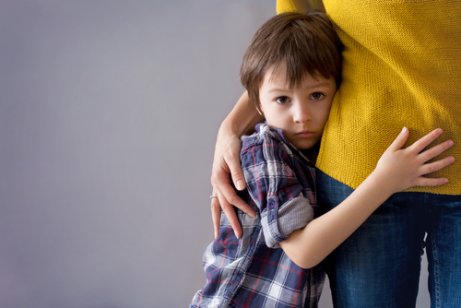The Phobia of Insects in Children: What You Need to Know

Today we want to tell you all you need to know about the phobia of insects in children.
Does your child have a very intense and irrational fear of insects? If this is true, you may be looking at a phobia. While this is nothing serious, it’s best to confront the situation as soon as possible.
First of all, it’s important to clarify that there is a major difference between a fear and a phobia. Fears are a feeling of aversion towards something, and everyone experiences this sensation at one point or another.
What’s more, fear is a mechanism that’s important for our survival. Over the history of man’s existence, fear has helped us remain alert against possible threats, and overcome them.
However, phobias are different. They involve a much stronger sensation that includes disproportionate anxiety. As a result, they interfere with a person’s ability to live a normal life.
In children, phobias can present themselves in diverse ways. They most frequently involve claustrophobia (fear of enclosure), coulrophobia (fear of clowns), and nyctophobia (fear of the dark), among others. And, of course, children may also experience entomophobia, the fear of insects.
Symptoms of entomophobia in children
In general, the symptoms that children experience when they come into contact with insects are similar to those of any other person with a phobia. The signs can be categorized as follows:
- Physical symptoms: These include hyperventilation, increased heart rate, trembling, dizziness, vomiting, intense sweating and pressure in the chest. Individuals may experience more unique symptoms.
- Emotional symptoms: A strong desire to escape, fear of losing control, a paralyzing sense of panic, and even fear of death. This is a very distressing situation and is practically impossible to control or disguise.
The causes of entomophobia in children
The first reason behind the appearance of an extreme fear of insects in children is a traumatic experience.
During childhood, we’ve all been the victims of ant bites and bee stings. But for some children, this experience leaves a greater mark than it does on others.
At the same time, in smaller children, the simple physical aspects of insects can be a cause of great fear. Just think about it: They have many legs, antennae, pinchers, wings and even hair.
For children who are just discovering the outside world, insects are practically miniature monsters!
Though it may seem like an exaggeration, parents often pass phobias onto their children. In other words, the fears belong originally to the parents.
However, through their behavior, comments and actions, they plant the same fears in the minds of their children.
In the same way, other factors in a child’s environment can contribute to the development of phobias. That’s why it’s extremely important that parents control their children’s exposure to certain content on television and the internet.
“Phobias involve a much stronger sensation that includes disproportionate anxiety. As a result, they interfere with a person’s ability to live a normal life.”
How to help children overcome their phobia of insects
The main technique for dealing with a fear, or even phobia, is by facing it. Of course, this shouldn’t occur abruptly, given that it would create an experience too traumatic to be positive.
Rather, adults should help children face their fear as gradually and progressively as possible.
To begin, we can use photographs or videos to establish initial contact. This will be very useful in helping children understand the way that insects live and behave.

Later on, the child can have a personal encounter with an insect, but without making physical contact. Observation is an excellent way to shed excessive fear little by little.
Then, as long as children are ready, you have to help them initiate contact with an insect. If they’re afraid to do so with their hands, they can use a stick or leaf. Through these small and simple actions, we can help children overcome their phobia of insects.
Of course, if this isn’t enough, you can also reach out for the help of a professional. Psychologists often treat simple phobias like this in just a few sessions.
Finally, it’s important to point out the three things you should never do in the case of phobias of insects, or any other phobia for that matter.
First of all, don’t ever make fun of your children’s fear. Even the simplest offensive remark about this fear can be very damaging to a child’s self-esteem. Remember, phobias aren’t something your child can control.
At the same time, don’t underestimate your children’s feelings or try to use reason to help them overcome them. Rather, take on an understanding attitude.
Through your actions, express absolute calm in the presence of these tiny creatures with whom we share our world. Over time, your children will overcome their fear.
Today we want to tell you all you need to know about the phobia of insects in children.
Does your child have a very intense and irrational fear of insects? If this is true, you may be looking at a phobia. While this is nothing serious, it’s best to confront the situation as soon as possible.
First of all, it’s important to clarify that there is a major difference between a fear and a phobia. Fears are a feeling of aversion towards something, and everyone experiences this sensation at one point or another.
What’s more, fear is a mechanism that’s important for our survival. Over the history of man’s existence, fear has helped us remain alert against possible threats, and overcome them.
However, phobias are different. They involve a much stronger sensation that includes disproportionate anxiety. As a result, they interfere with a person’s ability to live a normal life.
In children, phobias can present themselves in diverse ways. They most frequently involve claustrophobia (fear of enclosure), coulrophobia (fear of clowns), and nyctophobia (fear of the dark), among others. And, of course, children may also experience entomophobia, the fear of insects.
Symptoms of entomophobia in children
In general, the symptoms that children experience when they come into contact with insects are similar to those of any other person with a phobia. The signs can be categorized as follows:
- Physical symptoms: These include hyperventilation, increased heart rate, trembling, dizziness, vomiting, intense sweating and pressure in the chest. Individuals may experience more unique symptoms.
- Emotional symptoms: A strong desire to escape, fear of losing control, a paralyzing sense of panic, and even fear of death. This is a very distressing situation and is practically impossible to control or disguise.
The causes of entomophobia in children
The first reason behind the appearance of an extreme fear of insects in children is a traumatic experience.
During childhood, we’ve all been the victims of ant bites and bee stings. But for some children, this experience leaves a greater mark than it does on others.
At the same time, in smaller children, the simple physical aspects of insects can be a cause of great fear. Just think about it: They have many legs, antennae, pinchers, wings and even hair.
For children who are just discovering the outside world, insects are practically miniature monsters!
Though it may seem like an exaggeration, parents often pass phobias onto their children. In other words, the fears belong originally to the parents.
However, through their behavior, comments and actions, they plant the same fears in the minds of their children.
In the same way, other factors in a child’s environment can contribute to the development of phobias. That’s why it’s extremely important that parents control their children’s exposure to certain content on television and the internet.
“Phobias involve a much stronger sensation that includes disproportionate anxiety. As a result, they interfere with a person’s ability to live a normal life.”
How to help children overcome their phobia of insects
The main technique for dealing with a fear, or even phobia, is by facing it. Of course, this shouldn’t occur abruptly, given that it would create an experience too traumatic to be positive.
Rather, adults should help children face their fear as gradually and progressively as possible.
To begin, we can use photographs or videos to establish initial contact. This will be very useful in helping children understand the way that insects live and behave.

Later on, the child can have a personal encounter with an insect, but without making physical contact. Observation is an excellent way to shed excessive fear little by little.
Then, as long as children are ready, you have to help them initiate contact with an insect. If they’re afraid to do so with their hands, they can use a stick or leaf. Through these small and simple actions, we can help children overcome their phobia of insects.
Of course, if this isn’t enough, you can also reach out for the help of a professional. Psychologists often treat simple phobias like this in just a few sessions.
Finally, it’s important to point out the three things you should never do in the case of phobias of insects, or any other phobia for that matter.
First of all, don’t ever make fun of your children’s fear. Even the simplest offensive remark about this fear can be very damaging to a child’s self-esteem. Remember, phobias aren’t something your child can control.
At the same time, don’t underestimate your children’s feelings or try to use reason to help them overcome them. Rather, take on an understanding attitude.
Through your actions, express absolute calm in the presence of these tiny creatures with whom we share our world. Over time, your children will overcome their fear.
This text is provided for informational purposes only and does not replace consultation with a professional. If in doubt, consult your specialist.








